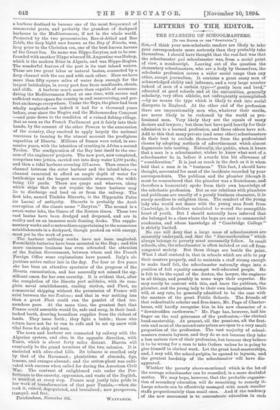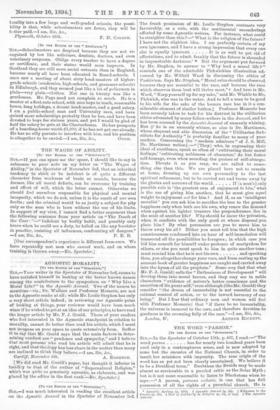LETTERS TO THE EDITOR.
THE STANDING OF SCHOOLMASTERS'.
[To THE EDITOR OF THE " EPHOTAT01/.1 think your non-scholastic readers are likely to take. your correspondents more seriously than they probably take themselves. I should have thought that the real fact was that the schoolmaster quci, schoolmaster was, from a social point of view, a nondescript. Leaving out of the question the elementary schoolmasters, who are a body by themselves, the scholastic profession covers a wider social range than any other, except journalism. It contains a great many men of acknowledged ability and, influence, and a very large number indeed of men of a certain type—" gently born and bred," educated at good schools and at the universities, generally scholarly, very often athletic, not unfrequently accomplished, —by no means the type which is likely to sink into social disrepute in England. At the other end of the profession there are unquestionably men who, whatever their merits, are never likely to be reckoned by the world as pro- fessional men. Very likely they are the equals of many doctors and lawyers ; but these last have paid heavily for their. admission to a learned profession, and these others have not. Add to this that many private (and some other) schoolmasters. do their beat to exclude themselves from the professional. classes by adopting methods of advertisement which almost. degenerate into touting. Naturally, the public, when it hears. that a man is a schoolmaster, wishes to know what sort of & schoolmaster he is, before it awards him his allowance of, "consideration." It is just as much in the dark as it is when told that a man is in "business." This fact, I should have, thought, accounted for most of the incidents recorded by your correspondents. The publican and the plumber (though it must be remembered that the plumber was a Scotchman, and. therefore a humourist) spoke from their own knowledge of the scholastic profession. But as our relations with plumbem and publicans are usually of a purely business character, it is. surely needless to enlighten them. The conduct of the young lady who would not dance with the young man fresh from Cambridge, is doubtless calculated to wound the susceptible- heart of youth. But I should naturally have inferred that she belonged to a class where the boys are sent to commercial academies, and whose knowledge of "Cambridge College is strictly limited.
No one will deny that a large mass of schoolmasters are- miserably underpaid, and that the " disconsideration "
always belongs to poverty must necessarily follow. Ia small schools, also, the schoolmaster is often isolated or cut off from congenial society. But these things are beside the points What I shall contend is, that in schools which are able to pay their masters properly, and to maintain a staff strong enough, to make itself felt, the schoolmaster naturally steps into ea position of full equality amongst well-educated people. He is felt to be the equal of the doctor, the lawyer, the engineer in all things, and possibly in some ways their superior. He may surely be content with this, and leave the publican, the plumber, and the young lady to their own imaginations. This will, at any rate, be generally admitted to be the case with the masters of the great Public Schools. The friends oil that redoubtable scholar and free-lance, Mr. Page of Charter- house, will hardly recognise him in his new character of a "downtrodden earthworm." Mr. Page has, however, laid his. finger on the real grievance of the profession,—the clerical, head-mastership. At present, all the pensions, all the first- rate and most of the second-rate prizes are open to a very small proportion of the profession. The vast majority of school- masters remain laymen, and they do so not because they take. a less serious view of their profession, but because they believe- it to be wrong for a man to take Orders unless he is going to give himself to clerical work. Let the great headsinasterships, and, I may add, the school-pulpits, be opened to laymen, and, the greatest hardship of the schoolmaster will have dies appeared.
Whether the poverty above-mentioned which is the lot of the average schoolmaster can be remedied, is a more doubtful matter. We may hope, however, that the probable organisa- tion of secondary education will do something to remedy it. Large schools can be effectively managed with much smaller staffs proportionately than small ones. And if the tendency of the new movement is to concentrate education in sack, locality into a few large and well-graded schools, the possi- bility is that, while schoolmasters are fewer, they will be hatter paid.—I am, Sir, &c., _Plymouth, October 29th, F. H. Comm







































 Previous page
Previous page